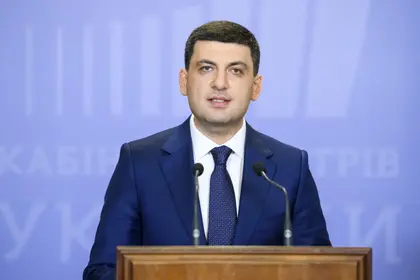Ukraine’s Prime Minister Volodymyr Groysman has announced his resignation at a press briefing on May 20 following the call to step down from President Volodymyr Zelenskiy. He said he will submit his resignation letter on May 22 after the scheduled meeting of the cabinet of ministers.
Groysman has led the government since April 2016 and is preparing to run for parliament in the upcoming election. He said he was planning on starting a new party.
- Find the newest Ukraine news pieces that came out today.
- Check the most up-to-date Ukraine news reports from today.
JOIN US ON TELEGRAM
Follow our coverage of the war on the @Kyivpost_official.
In his inauguration speech earlier on May 20, Zelenskiy announced he will dissolve the parliament and schedule an early election in two months. He also called for the government to resign.
Groysman said that he suggested to the new president to cooperate “in order to make Ukraine stronger,” but “the president chose a different path.”
“I believe that by giving his speech today he took full responsibility for the future threats,” he said.
Groysman joins several other high-profile officials who decided to leave office along with the ex-President Petro Poroshenko. Chief of the State Security Service Vasyl Hrytsak, Defense Minister Stepan Poltorak, and Secretary of the National Security and Defense Council Oleksandr Turchynov, Foreign Minister Pavlo Klimkin submitted their resignations earlier.
Groysman’s resignation has to be approved by the parliament. But the collapse of the ruling coalition last week as a result of People’s Front withdrawal can prevent the parliament from appointing a new or interim head of the government. By the law, the coalition and president nominate the prime minister. The new coalition has to be formed by June 16.
Groysman served as mayor of Vinnytsya, a city of 370,000 people located 270 kilometers southwest of Kyiv, which is often called the stronghold of Poroshenko. There, Poroshenko started his confectionary business Roshen and where he was first elected to parliament in 1998. Having served for two terms, Groysman moved on into national politics in 2014. And as Poroshenko’s protege, he started off high – as the speaker of the parliament. He became prime minister after the resignation of Arseniy Yatsenyuk in 2016. Although he had endorsed Poroshenko’s bid for re-election, over the time he distanced himself from his long-time ally and grew closer with another party in power, the People’s Front, the party of Arseniy Yatsenyuk and Interior Minister Arsen Avakov.
You can also highlight the text and press Ctrl + Enter




